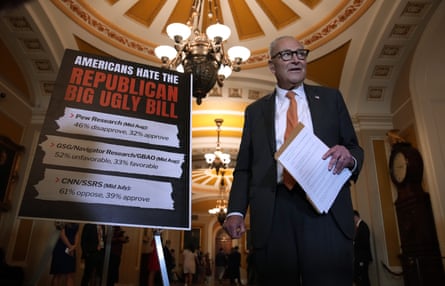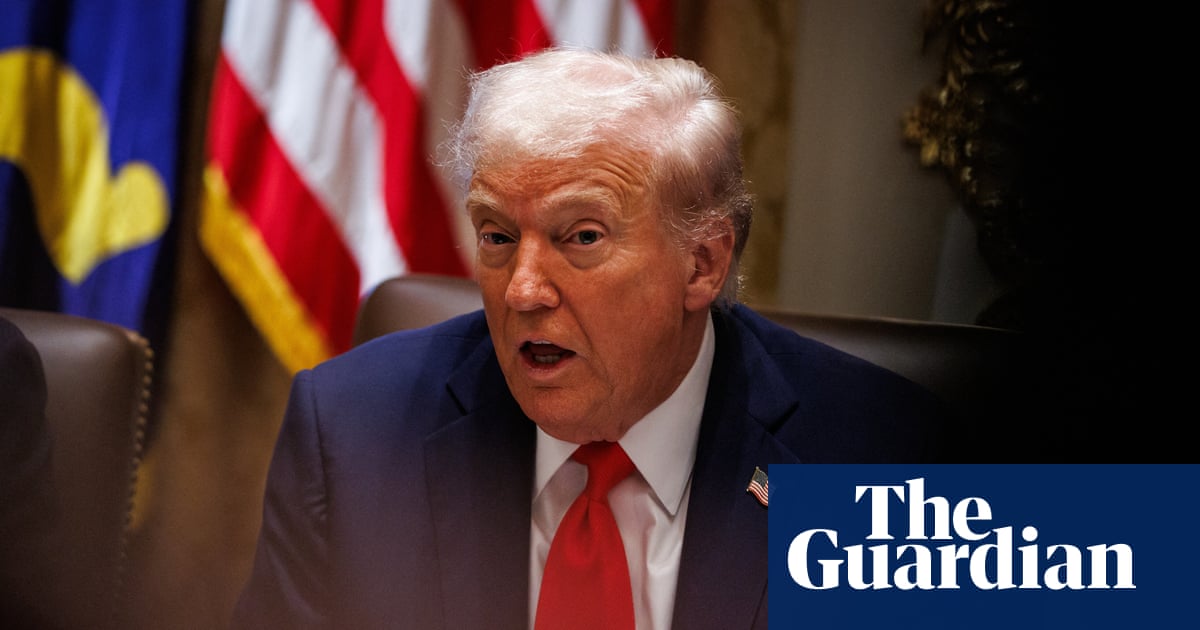Democrat Chuck Schumer returned to the Senate floor this week with some urgent questions. “Will Senate Republicans continue to kowtow to a leader they know is dragging the country down?” he demanded. “That they know is a pathological liar? Or will they, as the Founding Fathers intended, stand up to him? Will they help us fight America’s slide into authoritarianism?”
It was a recognition of how Donald Trump has spent eight months seeking to expand presidential power at the expense of Congress and others. He has signed 200 executive orders – more than Joe Biden in four years – unleashed squadrons of national guard troops in Washington, turned investigators on his political foes and sought to bring academic, cultural, financial and legal institutions to heel.
The capitulation has moved faster and further than even many of Trump’s critics expected and has left them looking for democratic guardrails that might yet constrain him. But as members of Congress returned to Washington this week, there were only flickers of hope that they might heed Schumer and reassert their usurped authority.
Trump’s Republican party holds narrow majorities in both the House of Representatives and Senate and remains overwhelmingly loyal to him. In May, during a debate on their signature tax and spending bill, the House speaker, Mike Johnson, called him “arguably the most powerful, the most successful, and the most respected president in the modern era of the United States”. Congress has in effect become his rubber stamp.
Larry Jacobs, director of the Center for the Study of Politics and Governance at the University of Minnesota, said: “One thing we could be confident of for the next year and a half is that Congress with Republican majorities is not going to check Donald Trump.
“The fear of Donald Trump in the midterm elections, the massive amount of campaign funds that he and his supporters have raised and that is being used to threaten members – in some cases physical threats – has tamed the Republicans in Congress. I have no hope that they’re going to check Donald Trump.”
Yet in recent days small fractures appeared in the edifice. Congressman Thomas Massie gained the support of fellow Republicans Marjorie Taylor Greene, Lauren Boebert and Nancy Mace on a discharge petition to force a vote on releasing the Jeffrey Epstein files. Hours after Trump described the issue as a “Democratic hoax”, Greene shot back: “It’s not a hoax because Jeffrey Epstein is a convicted pedophile.”
Some Republicans’ patience is also wearing thin with Trump’s health secretary, Robert Kennedy Jr, over his moves to undermine vaccines and purge leadership at the Centers for Disease Control and Prevention (CDC). Senator John Barrasso, a doctor, told Kennedy that he was “deeply concerned” about his leadership on vaccines.
In addition, numerous Republicans have faced blowback from voters during town halls in their district over the summer. Opinion polls show that Trump’s Big Beautiful Bill Act – rebranded as The Working Families Tax Cuts Act – is the most unpopular major piece of legislation in a generation. And Friday’s dismal jobs reports reflected uncertainty around his economic agenda.
If the trend continues, swing-state Republicans might be tempted to distance themselves from him in next year’s midterm elections and then treat him as a lame duck as the race for 2028 heats up.
Thom Hartmann, a political analyst and author of the upcoming book The Last American President: A Broken Man, a Corrupt Party, and a World on the Brink, suggests that Trump’s sway over Congress might be more fragile than it appears.
“The simple reality is that five or six Republicans in the House and two or three or four Republicans in the Senate could stop Trump in his tracks,” he said. “They can put an end to this insanity.
“Increasingly, as public opinion is turning against him – he’s polling very negatively in virtually every aspect of his presidency, from the economy to the troops in the streets to destroying federal agencies – at some point some of these Republicans are going to look around and say, you know, maybe the way to ensure my own political survival is to challenge this guy. That day can’t come soon enough for me.”
For Democrats, the challenge is different. They are trapped in the minority with few levers to pull. Schumer and Hakeem Jeffries, the minority leader in the House of Representatives, are likely to face pressure from their base to demonstrate fighting spirit. Both New Yorkers are facing criticism for refusing to endorse Zohran Mamdani, a progressive who won the Democratic primary for mayor of New York.

Schumer was also widely condemned for deciding in March to rally enough Democratic votes to pass a Republican-led spending bill to prevent a government shutdown. As Congress barrels towards a repeat at the end of the month, he appears unlikely to cave a second time.
Reed Galen, president of the Union, a pro-democracy coalition, said: “If you make an argument that we’ve already descended into an authoritarian hellscape, or we’re on the edge of it, then how much worse could be shutting down the government? The Republicans own it.
“Schumer has a lot of people watching him; if he gives in without some significant concession before the 30th then it’s going to be a very ugly fall and winter for him and for the party generally. You could see a lot of Democrats taking him to task because they’re like, if you’re not going to be the opposition party, why are you there?”
The energy in the party is, by contrast, with state governors such as Gavin Newsom of California and JB Pritzker of Illinois, who have been vociferous in pushing back against the Trump administration and offering the fight that activists crave. Both have the added incentive of potential runs for president in 2028.
Hartmann said: “Democrats are desperate for somebody who can reclaim the mantle of Franklin Roosevelt and Lyndon Johnson. Those were two presidents, two Democratic politicians, who did not take crap from anybody. They were famous for getting stuff done over the loud objections of even people in their own party and both of them were called dictators by Republicans loudly, frequently.”
Congress has been struggling to hold its own as Trump steamrolls past the legislative branch in ways unseen in peacetime presidencies. For example, he issued an executive order that effectively ignored a bipartisan law, affirmed by a unanimous supreme court decision, to ban the social media app TikTok.
He also bypassed Congress to shut down USAID and other agencies and deploy military forces in Los Angeles against peaceful protesters. Perhaps most threatening in the erosion of the separation of powers, Trump used a rare administrative tool to claw back federal funds that Congress had already approved.
Bill Galston, a senior fellow in governance studies at the Brookings Institution thinktank in Washington, suggested that the courts, not Congress, offer the best hope of providing a bulwark against authoritarianism.
“The president has made extraordinary assertions of executive power that raise constitutional questions as well as policy questions,” he said. “On those questions, in our system, only the supreme court can provide definitive answers and they’ll have no choice but to do that.
“For better, for worse, that is the thickest reed that Democrats can cling to because certainly between now and November 2026 their minority status isn’t going to change and the willingness of the majority to accommodate the minority is not likely to increase.”

 German (DE)
German (DE)  English (US)
English (US)  Spanish (ES)
Spanish (ES)  French (FR)
French (FR)  Hindi (IN)
Hindi (IN)  Italian (IT)
Italian (IT)  Russian (RU)
Russian (RU)  1 month ago
1 month ago
























Comments